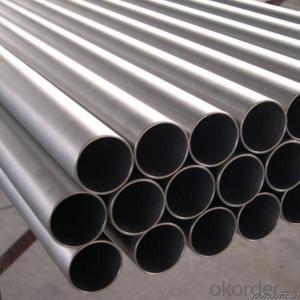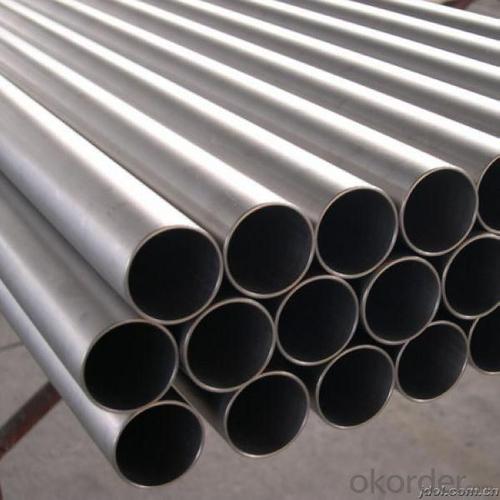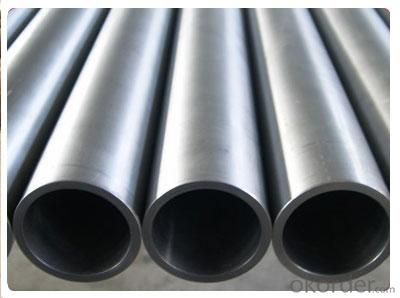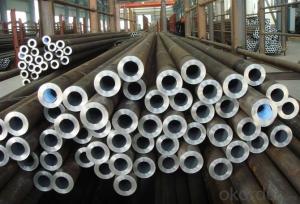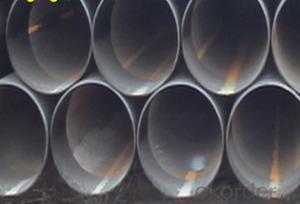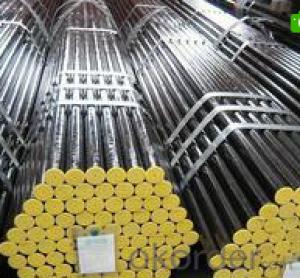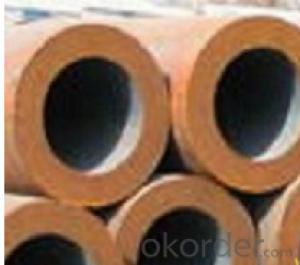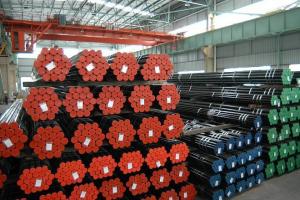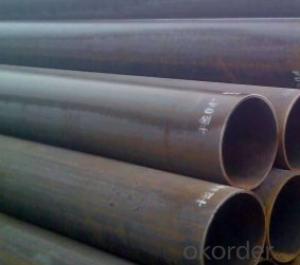ASTM API 5L Schedule 40 Seamless Steel Pipe
- Loading Port:
- Tianjin
- Payment Terms:
- TT or LC
- Min Order Qty:
- 25 m.t.
- Supply Capability:
- 10000 m.t./month
OKorder Service Pledge
OKorder Financial Service
You Might Also Like
We are company that have many years experience and professional manager team and engineer team and sales team, sure we will provide you high quality of pipe and professioanl service.
Seamless pipe possesses a hollow section and without seam around the strip steel. It is made with solid bar or steel ingot by perforating machine. As the facture process does not include any welding, seamless pipes are considered to be stronger and more durable. Generally speaking, seamless pipe has better pressure resistance and security than other classifications, and was usually more easily available than welded pipe.
2、Main Features of the Seamless Pipe:
• High working accuracy
• High strength
• Small inertia resistance
• Strong therming dissipine ability
• Good appearance
• Reasonble price
3、Seamless Pipe Specification:
Standard | GB, DIN, ASTM ASTM A106-2006, ASTM A53-2007 |
Grade | 10#-45#, 16Mn 10#, 20#, 45#, 16Mn |
Thickness | 8 - 33 mm |
Section Shape | Round |
Outer Diameter | 133 - 219 mm |
Place of Origin | Shandong, China (Mainland) |
Secondary Or Not | Non-secondary |
Application | Hydraulic Pipe |
Technique | Cold Drawn |
Certification | API |
Surface Treatment | factory state or painted black |
Special Pipe | API Pipe |
Alloy Or Not | Non-alloy |
Length | 5-12M |
Outer Diameter | 21.3-610mm |
Grade | 20#, 45#, Q345, API J55, API K55, API L80, API N80, API P110, A53B |
Standard | ASME, ASTM |
1) Material:20#(ASTM A 106/A53 GRB.API5LGRB,GB),45#,16Mn,10#.
2) Specification range: OD: 21.3-610mm, WT:6-70mm, length:6-12m or according to the requirement of clients.
3) Executive standards: GB, ASME API5L.ASTM A 106/A53,Despite of the above standards, we can also supply seamless steel pipe with standard of DIN, JIS, and so on, and also develop new products according to the requirements of our clients!
4) Surface: black lacquered, varnish coating or galvanized.
5) Ends: Beveled or square cut, plastic capped, painted.
6) Packing: bundles wrapped with strong steel strip, seaworthy packing.
4、Packaging & Delivery:
Packaging Details: | seaworthy package, bundles wrapped with strong steel strip |
Delivery Detail: | 15-30days after received 30%TT |
5、FAQ of Seamless Pipe:
①How is the quality of your products?
We have many years business experience in this area, and we have professional engineer and manager team and sure we can provide you high quality production and professional service.
②How about price?
Yes, we are factory and be able to give you lowest price below market one, and we have a policy that “ for saving time and absolutely honest business attitude, we quote as lowest as possible for any customer, and discount can be given according to quantity”,if you like bargain and factory price is not low enough as you think, just don’t waste your time.Please trust the quotation we would give you, it is professional one.
③Why should you chose us?
We can give you both.Additionally, we can also offer professional products inquiry, products knowledge train(for agents), smooth goods delivery, exellent customer solution proposals.Our service formula: good quality+good price+good service=customer’s trust
SGS test is available, customer inspection before shipping is welcome, third party inspection is no problem.
6、Seamless Pipe Images:
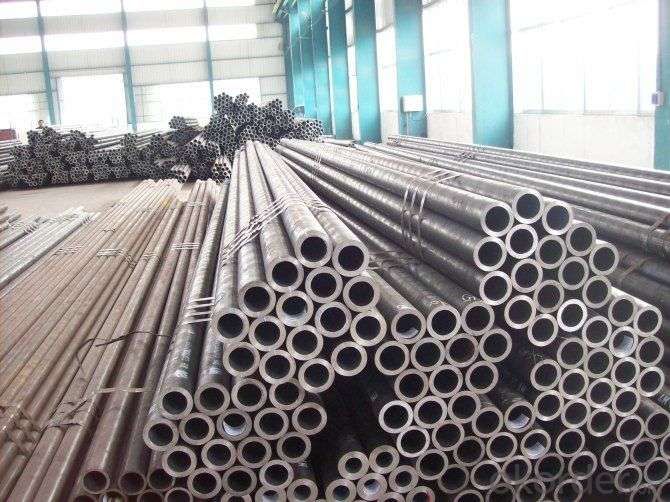
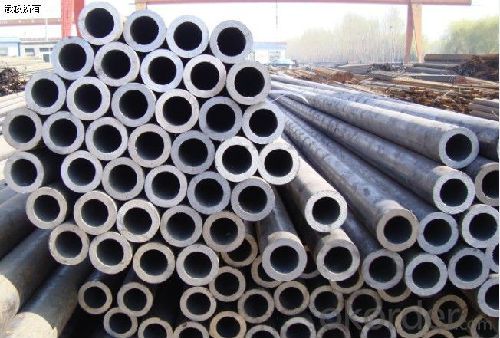
- Q: What is the outer diameter and wall thickness of the welded steel pipe of national standard DN250?
- DN (nominal diameter) 250 is generally the industry said 273, welded steel pipe (spiral steel pipe) thickness is generally between 6-8mm, more common.
- Q: How does the price of steel pipes vary based on size and grade?
- The price of steel pipes tends to vary based on their size and grade. Generally, larger pipes and higher-grade steel tend to have higher prices due to the increased raw material and manufacturing costs involved. However, market demand and supply dynamics can also play a role in the price fluctuations.
- Q: What is the average lifespan of a steel pipe?
- The average lifespan of a steel pipe can vary depending on various factors such as the quality of the steel, the environment it is exposed to, and the maintenance practices followed. However, on average, a well-maintained steel pipe can last anywhere between 20 to 100 years.
- Q: How long is the seamless tube?
- Generally finished seamless steel tubes are less than twelve meters, mainly for the convenience of shipment.In times of rolling (processing), the steel pipe can reach 80 meters or longer.
- Q: How are steel pipes used in fire protection systems?
- Steel pipes are an integral part of fire protection systems, primarily used for the distribution of water or other fire suppressants in buildings. These pipes are known for their strength, durability, and resistance to high temperatures, making them ideal for withstanding the intense conditions of a fire. In fire protection systems, steel pipes are commonly used to create a network of pipes that deliver water to sprinkler heads or fire hydrants throughout a building. This network ensures that water is readily available to suppress or extinguish a fire in case of an emergency. One of the key advantages of steel pipes in fire protection systems is their ability to withstand the high pressure and flow rates required for effective fire suppression. Steel pipes can handle the forceful water flow needed to quickly and efficiently distribute water to the affected areas, helping to control and extinguish the fire as soon as possible. Additionally, steel pipes are resistant to corrosion, which is essential for maintaining the integrity of the fire protection system over time. Corrosion can weaken pipes, leading to leaks or even complete failure, which can be catastrophic in a fire situation. Steel pipes, however, have a longer lifespan and require less maintenance compared to other pipe materials, ensuring the system remains reliable and functional for years to come. Furthermore, steel pipes are often used in fire protection systems due to their fire resistance properties. Steel is inherently fire-resistant, meaning it can withstand high temperatures without deforming or losing its structural integrity. This is crucial in fire protection systems as it allows the pipes to remain intact and continue delivering water even in the midst of a fire, ensuring the safety of occupants and minimizing damage to the building. In summary, steel pipes play a vital role in fire protection systems by ensuring a reliable and efficient distribution of water or fire suppressants. Their strength, durability, resistance to high temperatures, and corrosion resistance make them an ideal choice for effectively combating fires and safeguarding lives and property.
- Q: What is the composition of steel pipes?
- Steel pipes are primarily composed of iron and carbon, with trace amounts of other elements such as manganese, phosphorus, sulfur, and silicon.
- Q: Are steel pipes suitable for use in food processing industries?
- Yes, steel pipes are suitable for use in food processing industries. Steel pipes are known for their durability, strength, and resistance to corrosion, making them ideal for handling food products. They are also easy to clean and maintain, ensuring proper hygiene standards in the food processing industry. Additionally, steel pipes are capable of withstanding high temperatures and pressures, making them suitable for various food processing applications such as transporting liquids, gases, and solids.
- Q: Can steel pipes be used for the construction of tunnels?
- Yes, steel pipes can be used for the construction of tunnels. Steel pipes are commonly used in tunnel construction for various purposes such as drainage, ventilation, and utility installations. They are strong, durable, and can withstand high pressures and loads, making them suitable for tunnel applications. Additionally, steel pipes can be easily fabricated, installed, and maintained, making them a popular choice in tunnel construction projects.
- Q: How are steel pipes used in agriculture?
- Steel pipes are commonly used in agriculture for a variety of purposes, such as irrigation systems, water supply lines, and drainage systems. These pipes are durable, resistant to rust and corrosion, and can withstand high pressure, making them ideal for transporting water and other fluids across farmland. Additionally, steel pipes are used to construct structures like greenhouses, fencing, and livestock enclosures, providing strength and stability to support agricultural operations.
- Q: Are steel pipes suitable for high-pressure applications?
- Yes, steel pipes are highly suitable for high-pressure applications. Steel is known for its strength and durability, making it an ideal material for carrying fluids or gases under high pressure. Steel pipes have the ability to withstand extreme conditions and maintain their structural integrity, making them a reliable choice for various industries such as oil and gas, chemical processing, and power generation.
Send your message to us
ASTM API 5L Schedule 40 Seamless Steel Pipe
- Loading Port:
- Tianjin
- Payment Terms:
- TT or LC
- Min Order Qty:
- 25 m.t.
- Supply Capability:
- 10000 m.t./month
OKorder Service Pledge
OKorder Financial Service
Similar products
Hot products
Hot Searches
Related keywords
